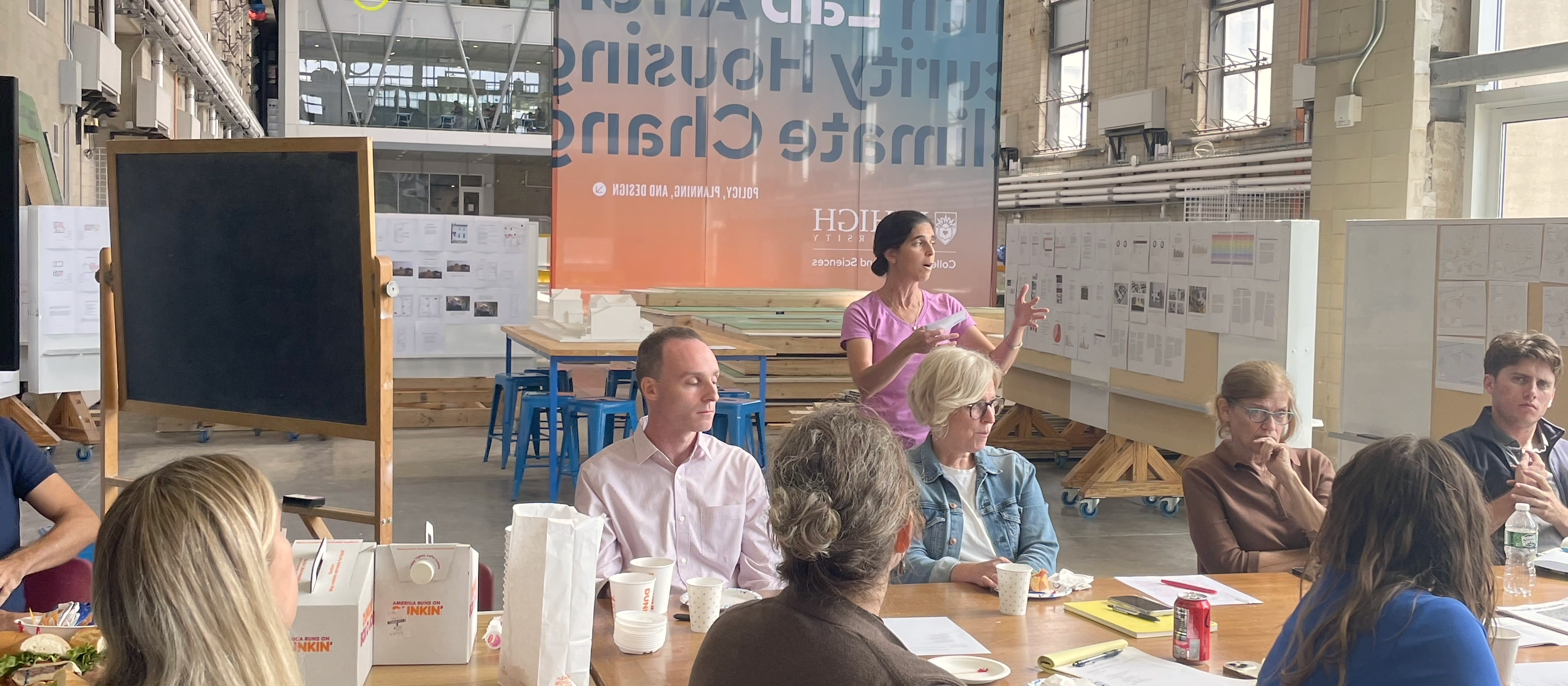
Sep 9, 2024
Isabelle O'Toole
Steering Committee Meeting
Discussing Zoning Reform for Affordable Housing
On Friday September 6th, the Small Cities Lab hosted the first Alley House Program Steering Committee Meeting. The Steering Committee consists of many actors in Bethlehem. At the first meeting, the Small Cities Lab presented an overview of the Alley House Program’s work so far.
On Friday September 6th, the Small Cities Lab hosted the first Alley House Program Steering Committee Meeting. The Steering Committee consists of many actors in Bethlehem, who provide oversight and guidance to ensure the Alley House Program’s success. Attendees at the first meeting included members of the Bethlehem City government, New Bethany, Lehigh Valley Planning Commission, Bethlehem City Council, Lehigh University, residents of different Bethlehem neighborhoods, the homeowner of the first pilot Alley House unit, and fellow architects in the Lehigh Valley.
At the first meeting, the Small Cities Lab presented an overview of the Alley House Program’s work so far. The Alley House Program is a collaborative effort between the Small Cities Lab, the City of Bethlehem, Community Action Lehigh Valley, and New Betheny to increase the supply of quality affordable housing through the revitalization of alley housing–an historic housing type in the Lehigh Valley. In the mid-20th century, down-zoning ceased the development of alley houses (also called “accessory dwelling units” or “second units”) on single-family parcels. In the current Bethlehem ordinance, “second units” are not allowed. The Program is building an Alley House unit on Raspberry
Street in West Bethlehem through a special exemption.
Given this zoning context, the committee discussed the Program’s effect on the city’s zoning ordinance, and how we should move forward with potential zoning reform. The Program is looking to build more affordable, demonstration alley houses, increase broader development of “second units,” and lessen the single family zoning regulations–all of which would require reform to the current ordinance. The Small Cities Lab will provide a zoning reform proposal to the City which will be informed by Lab-sponsored research. Over the summer, Lehigh undergraduate students surveyed every existing alley house in Bethlehem. They studied 8,187 housing units, including 919 alley houses on over 50 miles of alley. The Lab is also filling the large knowledge gap in ADU research, completing case studies in small cities across the country. The Lab researches the specific ADU zoning regulations in each small city to understand the effects of ADU deregulation on housing in these cities.
In addition, the City of Bethlehem will hire a consultant to assess a zoning ordinance update for broader allowance of accessory dwelling units. Since the consultant is less familiar with Bethlehem, the consultant is required to collaborate closely with the Small Cities Lab and the Program’s community partners. The consultant will deliver a survey of ADUs compatibility with their surroundings as well as the zoning text amendment. The City has given an approximation of a year timeframe for the completion of this process. After the conclusion of the presentation and Alley House Program updates, the committee posed
Questions to the Program heads:
Q: Is the Alley House Program involving residents from South and North Bethlehem?
A: The Program is intentional about the location of the demonstration unit in West Bethlehem–there is less density and more available land in that part of the City. If zoning reform is made, people from other neighborhoods in the City will be involved.
Q: Regarding public works, does the city have the utility capacity for more housing units (sewer, water, etc)?
A: The units will be connected to the sewer system, but they should not put significant, extra strain on the system. Development organizations will have the best understanding of this. The consultant hired by the City will also need to understand the public works thoroughly. The Small Cities Lab zoning case studies (how ADU reform has affected similar sized cities) will also help answer this question.
Q: How do zoning ordinance updates to ADUs work on a state versus municipal level?
A: States can broadly allow ADU construction, but municipal zoning ordinances set regulations and guidelines for the units.
Q: If this reform lessens single family zoning regulations, how do we prevent large developments from being built that will change the character of the neighborhood?
A: The goal of the zoning proposals and consultations is to find an appropriate middle ground between preventing developer buy-up, but still having units built to address Bethlehem’s increasing housing crisis. The consultant may suggest added regulations, including a parking requirement or owner occupancy rule in which the owner of the parcel must live in one of the units. The first Steering Committee Meeting for the Alley House Program proved very successful. The Small Cities Lab and the City of Bethlehem will host three more quarterly meetings on the first Tuesday of
every month.
Filed under: News